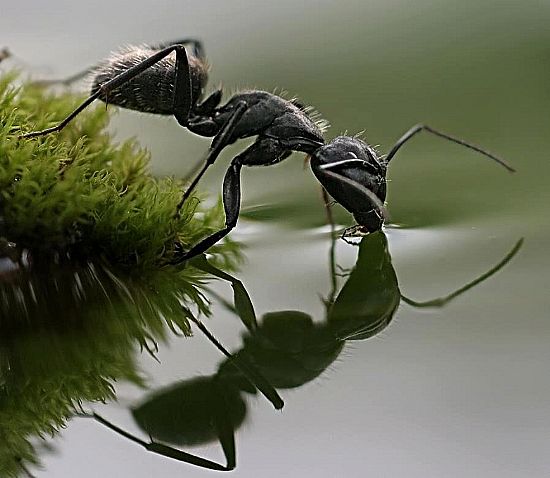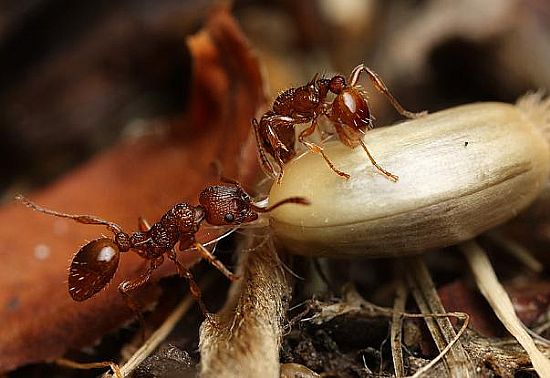Ant Food
Do ants need to drink?
Like any living creature, ants do need water to survive; and while they love to drink sweet fruit juices, and also honey and sugar water, they do drink plain rain water or from small streams and ponds.
This is without a doubt perhaps the best ever photo of an ant drinking, though sadly I cannot remember who took the photo to credit the person.

What do ants eat?
Think carefully for a moment. You like a varied diet, as eating nothing but chicken all the time would soon become very boring; and you would soon get sick of it and want something else. Ants too like to have varied diets, but their liking for some foods constantly brings them into conflict with humans. You're having a quiet picnic by a cool river, or sitting have cakes in your garden. Before long you have unwanted guests like wasps or flies hovering around you; but look who is carrying off your picnic food or cake crumbs. Yes, our little friends the ants.
Not all ants that eat seeds are Harvester Ants, as this photo by Brian Valentine shows 2 Myrmica rubra workers carrying home a seed to their nest.

Some ants will invade your home just to get at sweet stuff like jam or sugar. Leave a bag of sweets in the glove compartment of your car, and you can bet that ants will find them sooner or later. Many people may think that Leaf Cutter ants eat only leaves from plants, but the foliage of plants is only collected to be chewed into a mulch and made into compost on which to grow their fungus garden. A commom belief is that Army and Driver ants will devour everything that crosses their path, including people and even elephants. The truth is that most large animals are able to get out of the way of these vast hoardes of ants, and the ants kill more pests than anything else, unless it is tied up and cannot run away or kept in a cage or pen. Driver ants may eat dead or injured large animals if they get the chance, but it is very unlikely that healthy humans and other creatures could be eaten, even if they are asleep when the ants come into an African village.
Even ants that have become specialised foragers and seem to live off a specific type of food still require a varied diet. Human made foods, or dead insect prey has to be consumed quickly or it begins to decompose and grow mould or fungus. Any food that you feed to captive ants MUST be removed after a maximum of 3 days, regardless of how it may appear. A lot of ant keepers place too much faith in a food called "Ant Jelly" made from a mixture of gelatine and eggs with some other ingredients added. I find that my ants prefer my wife's home made cake far more and eat it eagerly, whereas "Ant Jelly" is left to go a lovely shade of blue-green mould. So by all means try a few different food stuffs for your ants, but do remember what they eat in the wild; and don't forget to cover your icing covered cakes and jam sandwiches when you next have a picnic.
Do ants need sugar?
Some people may ask the question, is sugar water essential for ants to live on? Many of us know full well how ants are attracted to sweet foods like cake, sugar, fruit jam or icing covered dough nuts; but what does sugar really do for ants?
Sugar in any form gives us energy, and so it does with ants. Also ants can't eat solid food as their mouth parts just are not capable of doing so! Too much sugar is bad for us and makes you fat or gives you tooth decay. It is also hygroscopic, which means it absorbs water and can lead to ants becoming dehydrated if they eat too much of it.
This does not stop ants from collecting honey-dew from aphids, or licking up sweet tree sap, or gorging themselves on honey that may drip down from a wild nest of bees. All these are natural sugars, and to be honest are better than giving your ants refined sugars, even though we do get our sugar from plants like sugar cane or sugar beet.
An email I had recently asked if sugar water was needed for ants to survive? The best answer to this is, give ants whatever they will eat in the way of sugar; but only in moderation, as excessive amounts can be harmful if they over-indulge. However some sugar in a liquid form will give adult ants energy, but for the queen(s) to lay eggs they require a good protein diet; and this is why ants need meat in the form of dead insects etc.
There is no hard and fast rule about feeding ants sugar, as they really do love the stuff; but I find a good wild flower honey goes down a treat with my own ants. Being a natural product made by bees, it contains stuff like pollen, nectar and other good ingredients that are good for both ants and humans; plus it is a natural antiseptic and very healthy for insects and people alike, and as it is already broken down into a simple sugar, it is easily digested and absorbed into the gut. If you buy the set honey, it does contain more bees wax and is more solid, so it will need to be mixed in warm water first; but even the liquid honey is best served with a little added water. Always remember to remove any uneaten foods after 3-4 days to avoid the formation of mould, which could cause problems if left to grow, as this could poison your ants.
Great Books about Ants
This page will give details about books which you can buy about ants. Any which are out of print or no longer available due to their age may not be mentioned, only those which are currently available in book stores or to buy online.
When possible I will detail as much information about each book as I can find, and give my account of how much I enjoyed reading the book if I have added it to my own library collection, so that you may judge for yourself whether you wish to purchase it or not. All of the books listed below I have in my own book collection.
Ants - Author M. V. Brian
This book was my first serious ant book, as when I was a boy and started to collect and study ants, this book was not published. It came out in 1976, and sadly is no longer in print today.
However, you can buy this book second hand from Amazon. co.uk, and it well worth it as I have found this to be my bible on British Ants since I bought it back in 1977.
Adventures Among Ants - Mark W. Moffett
The very latest addition to my library of ant books, I also purchased this online from Amazon; and it was money well spent. Mark has placed the reader so that you feel it is you living the adventure, and you actually believe that you are there among the ants. Colour photos are superb and plentiful, and I recommend buying this book not just for the excellent way it is written, but for the joy of seeing many truly remarkable photos of ants.
I thought I had trouble when Formica rufa workers attacked my foot, but Mark actually has his foot attacked by Pheidelogeton diversus which is just one of his great pictures in his book. Buy it and see for yourself.
Journey to the Ants - Holldobler & Wilson
Yet another great book written by two of the worlds leading Myrmecologists, Bert Holldobler and Edward O. Wilson (who is soon to publish his own book about ants).
This book is a little more scientific than some, but not really that difficult to read and is full of interesting information and photos. Also unlike the previous 2 books, this comes as a paperback edition which makes it cheaper to buy. Well worth adding to your collection if you've gone beyond the stage where studying ants is just like watching any other insect.
The Earth Dwellers - Erich Hoyt
If you want plenty of pictures, then you won't find them in this book. What you will find is plenty of very accurate information which will keep you occupied for a long time. So if you love reading and wish to know about ants, Leaf Cutter Ants in particular, then this book is for you. It does contain a very useful glossary of terms used in Entomology to describe ant anatomy and classification.
Ants of the British Isles - Gary J. Skinner
A nice and compact paperback which doesn't have a lot of info, but does have some nice colour photos of ants. A big plus is that you can buy this book from Amazon for a very low price of just 1 penny, although you do have to pay £2-75p for P&P.

